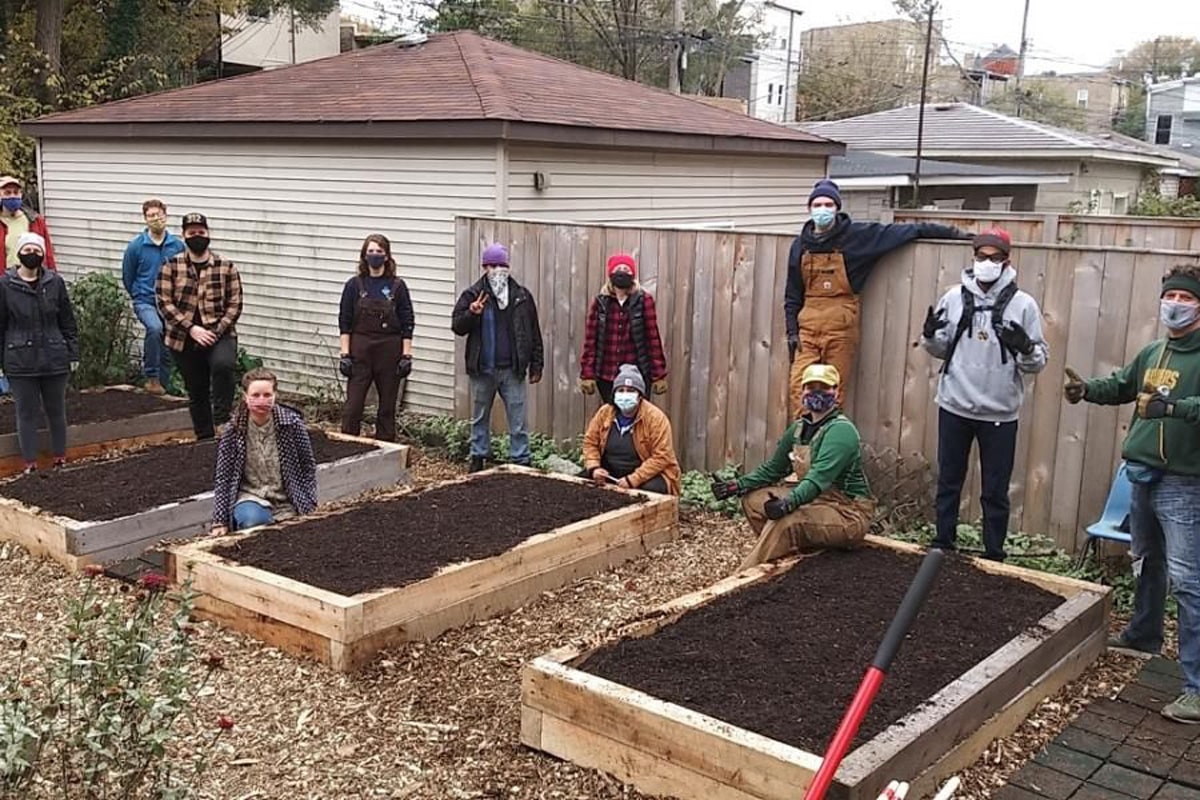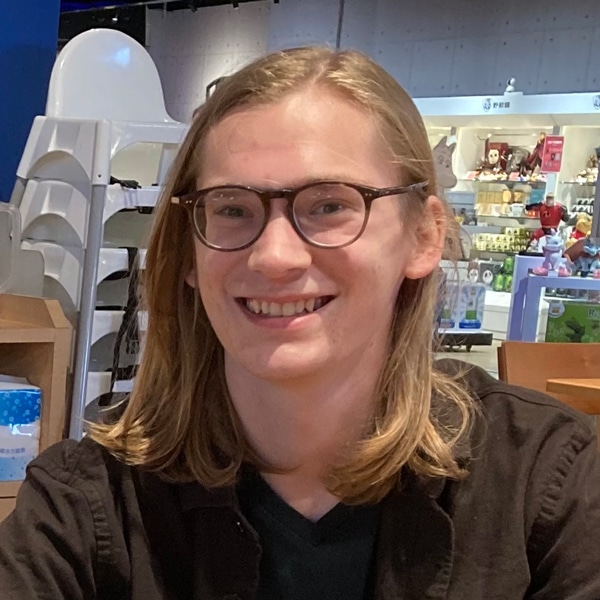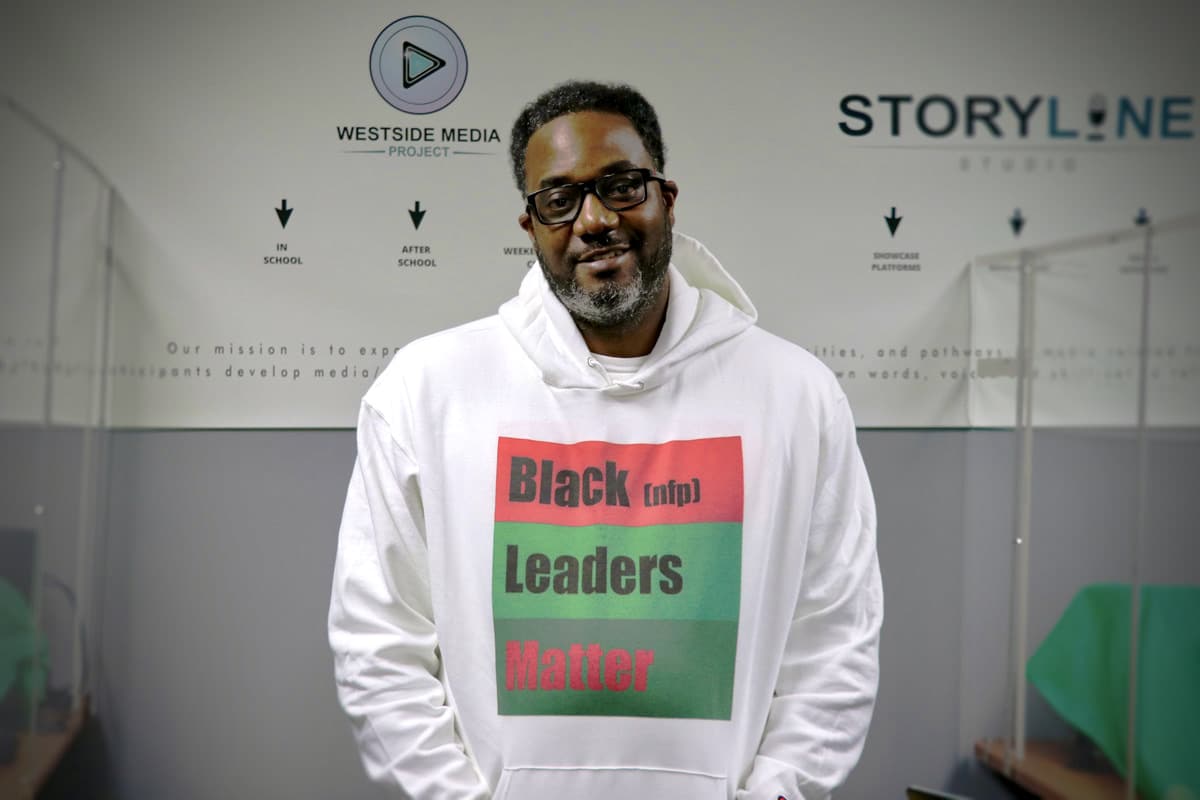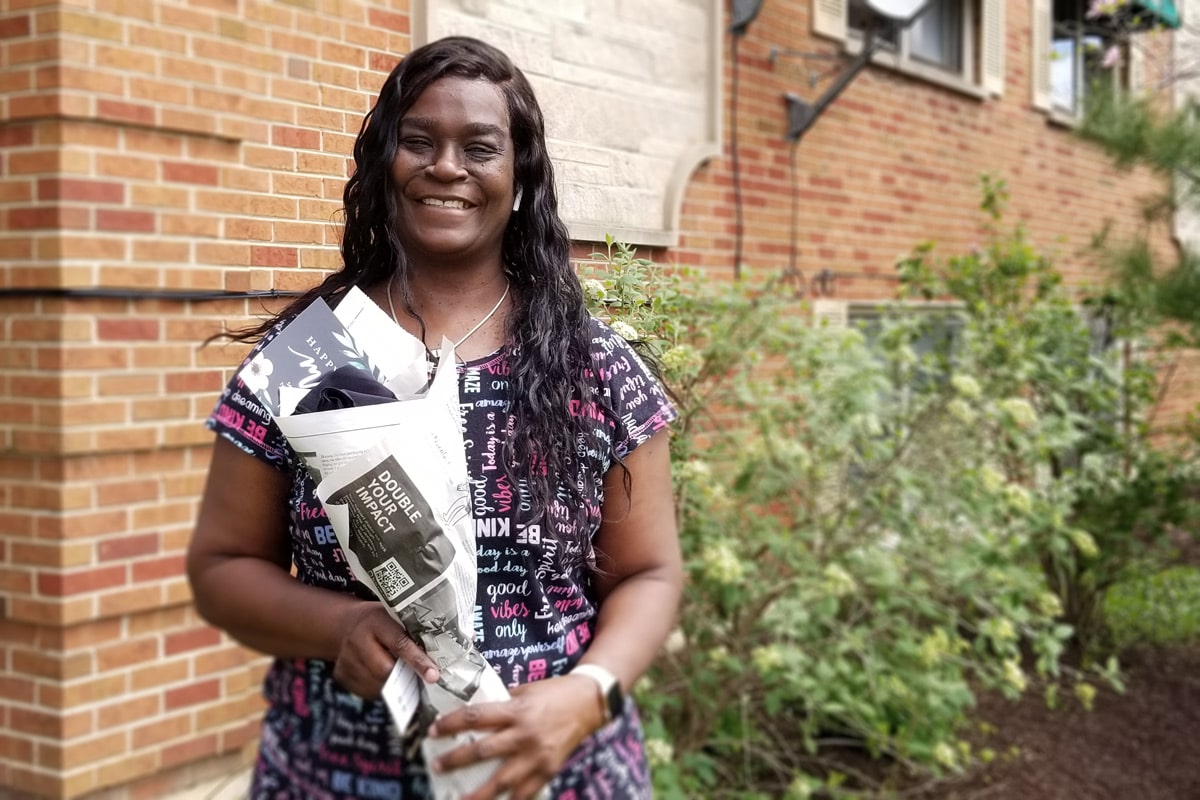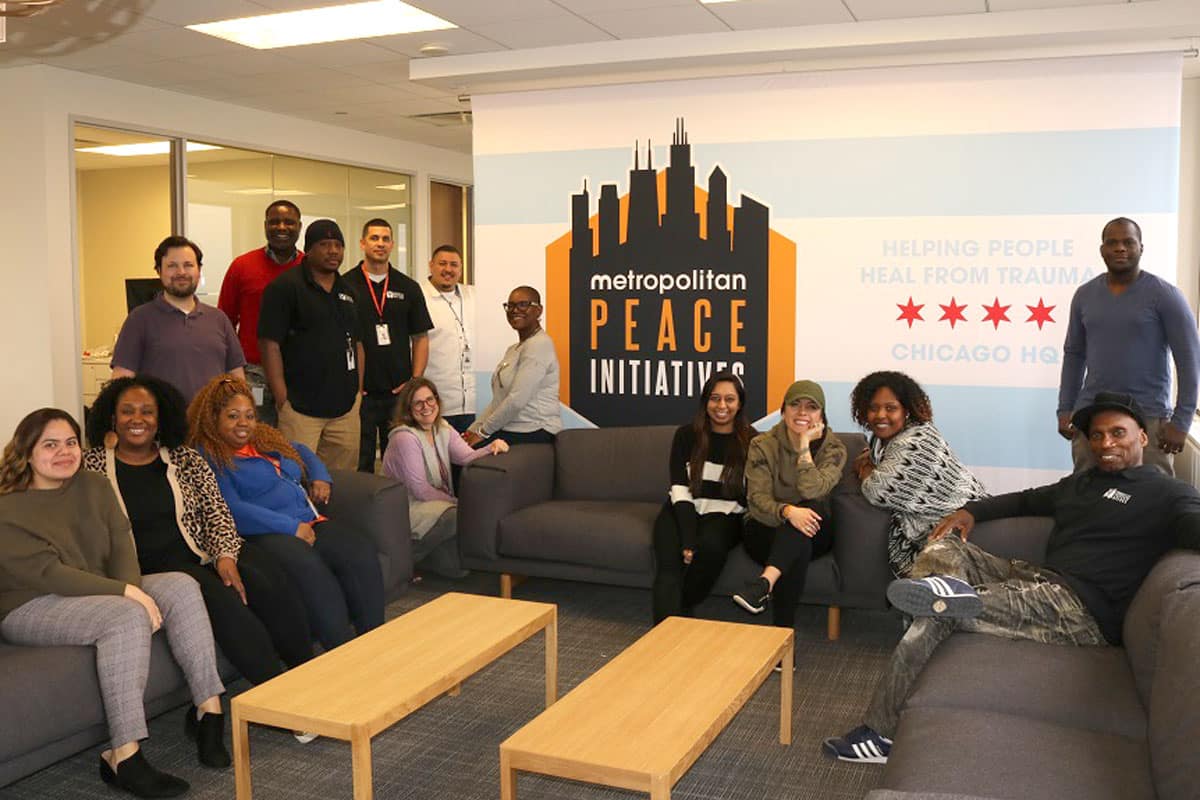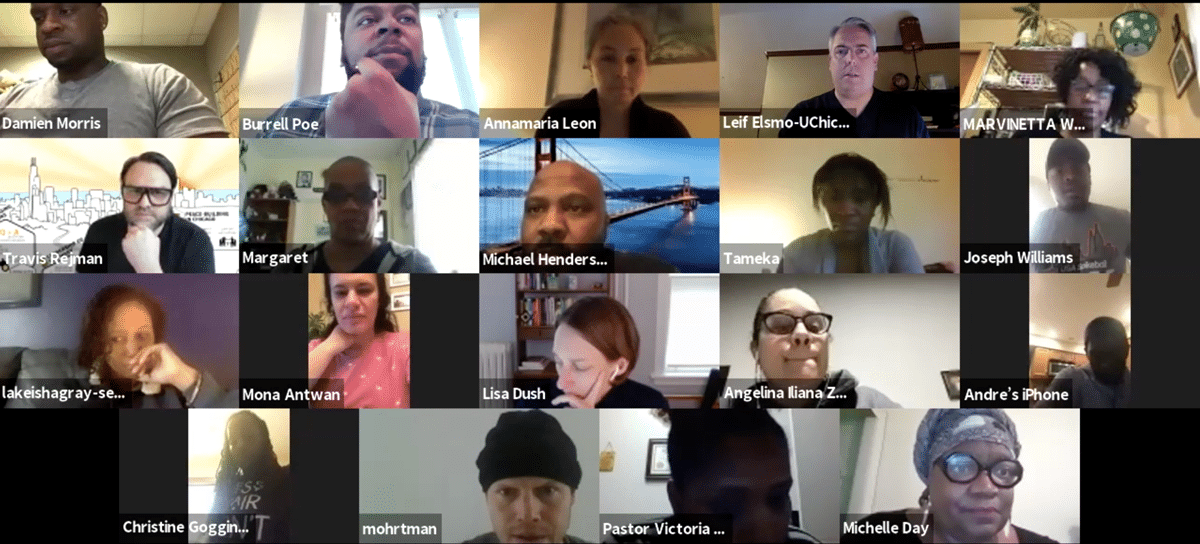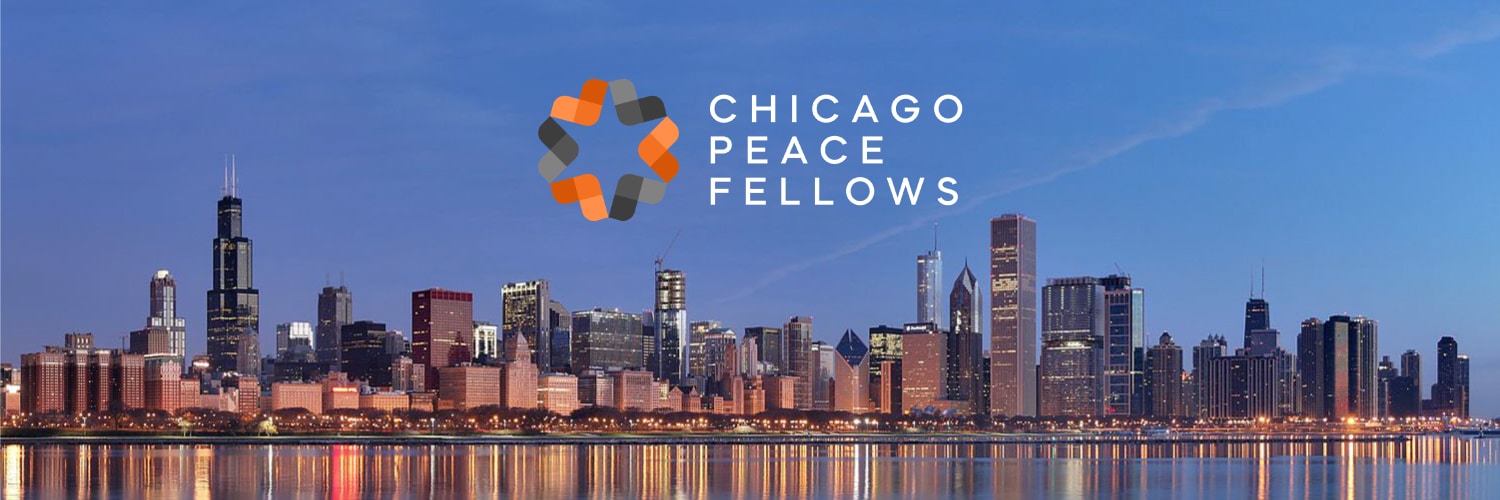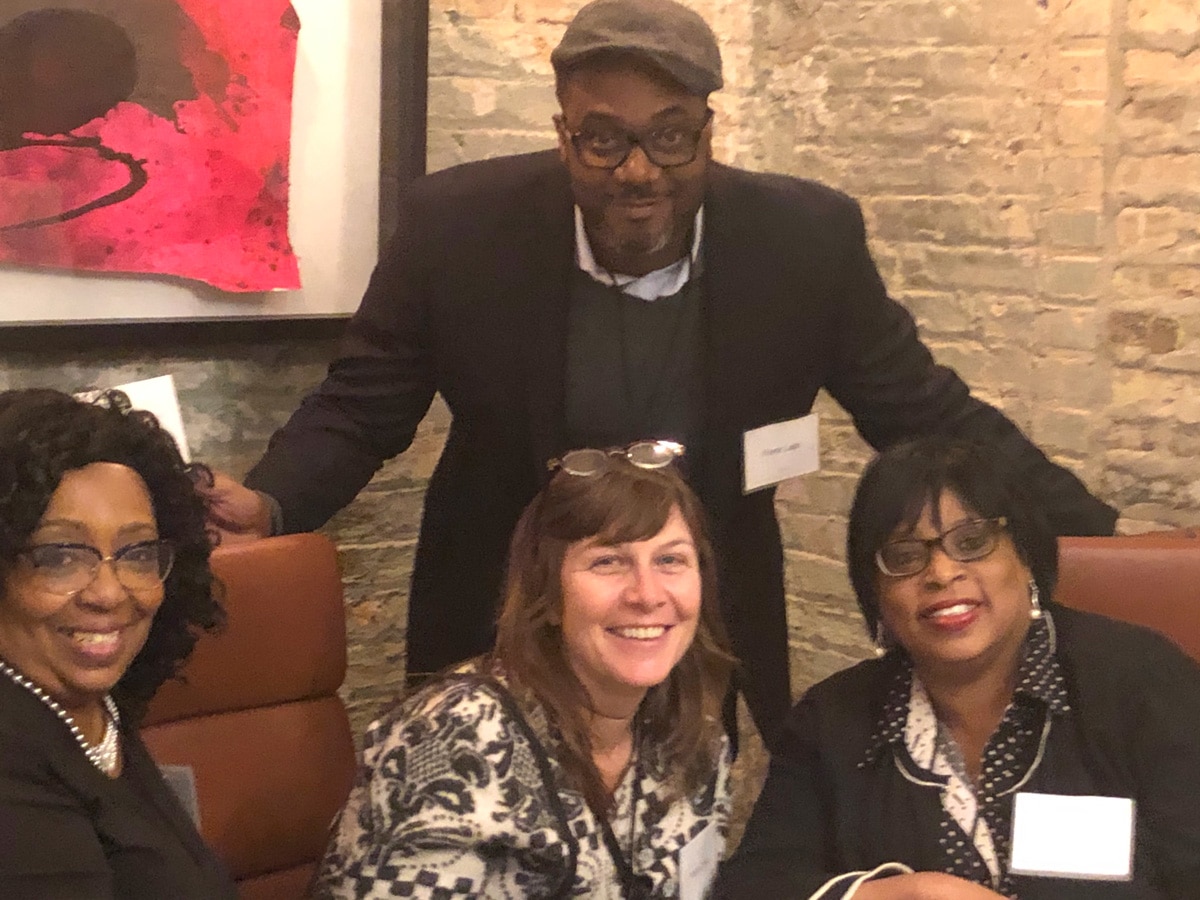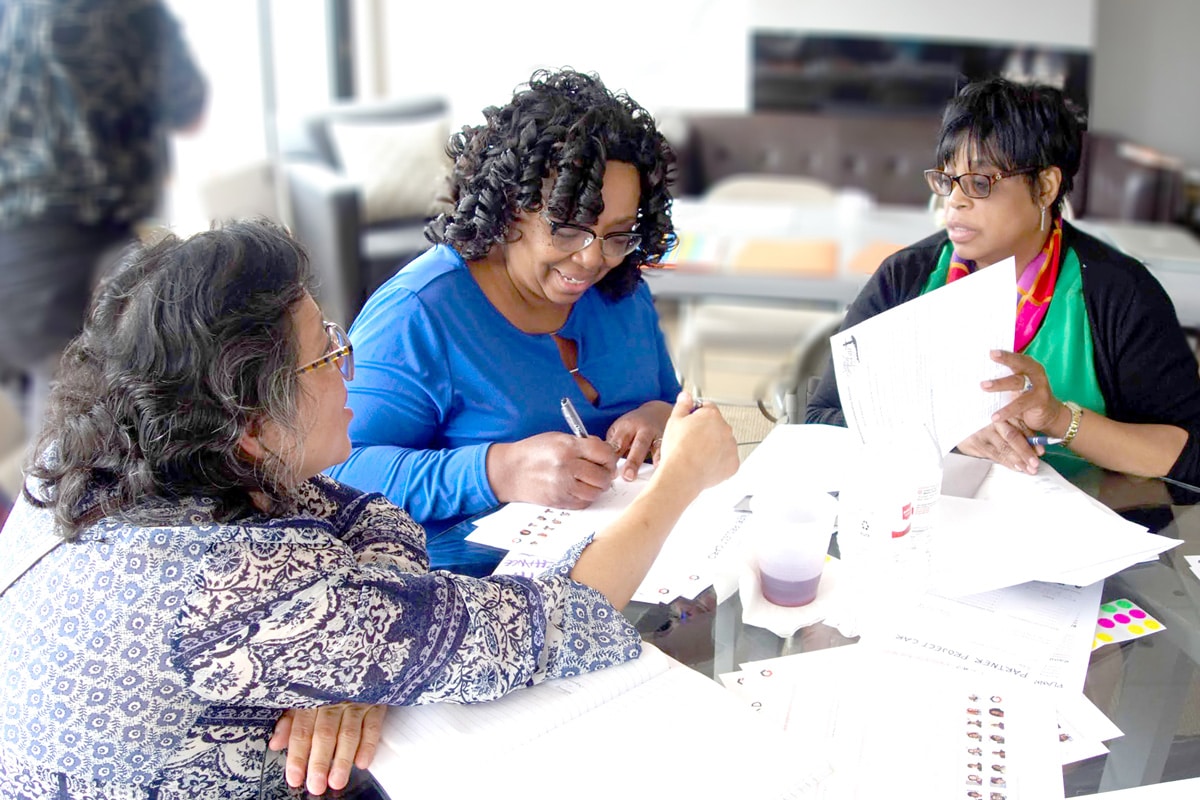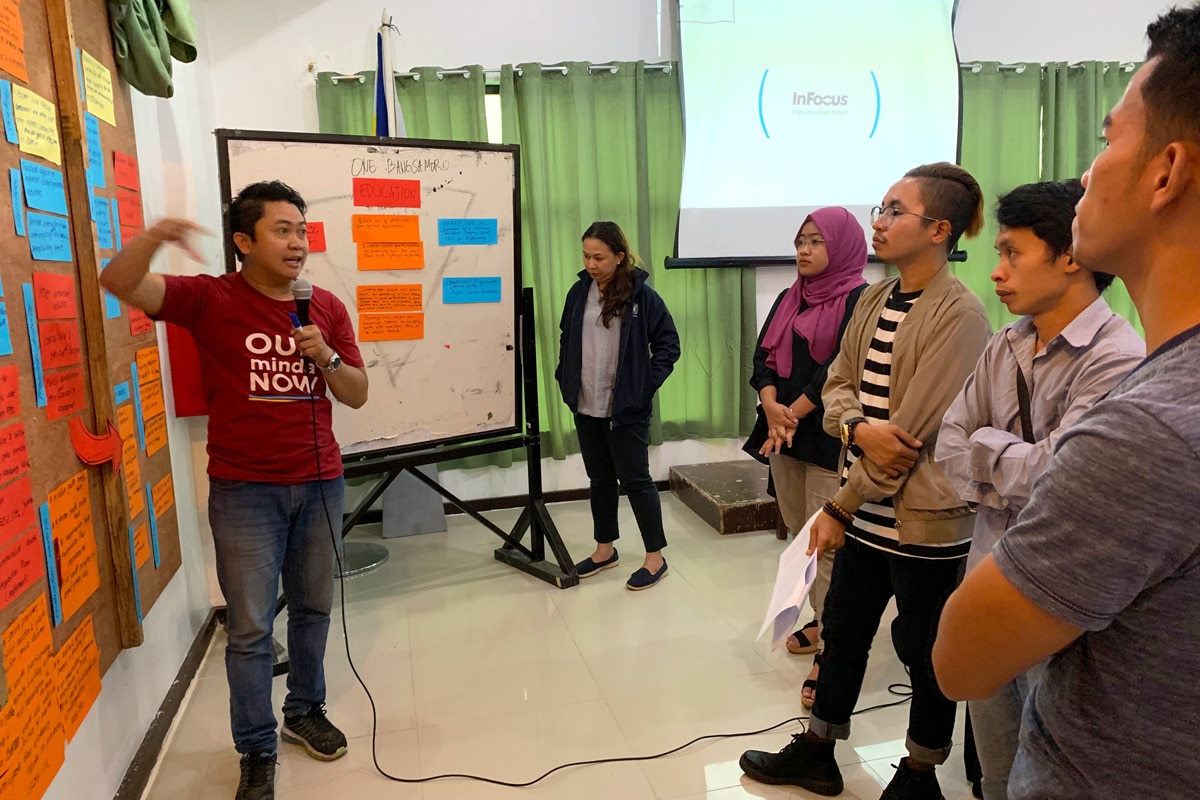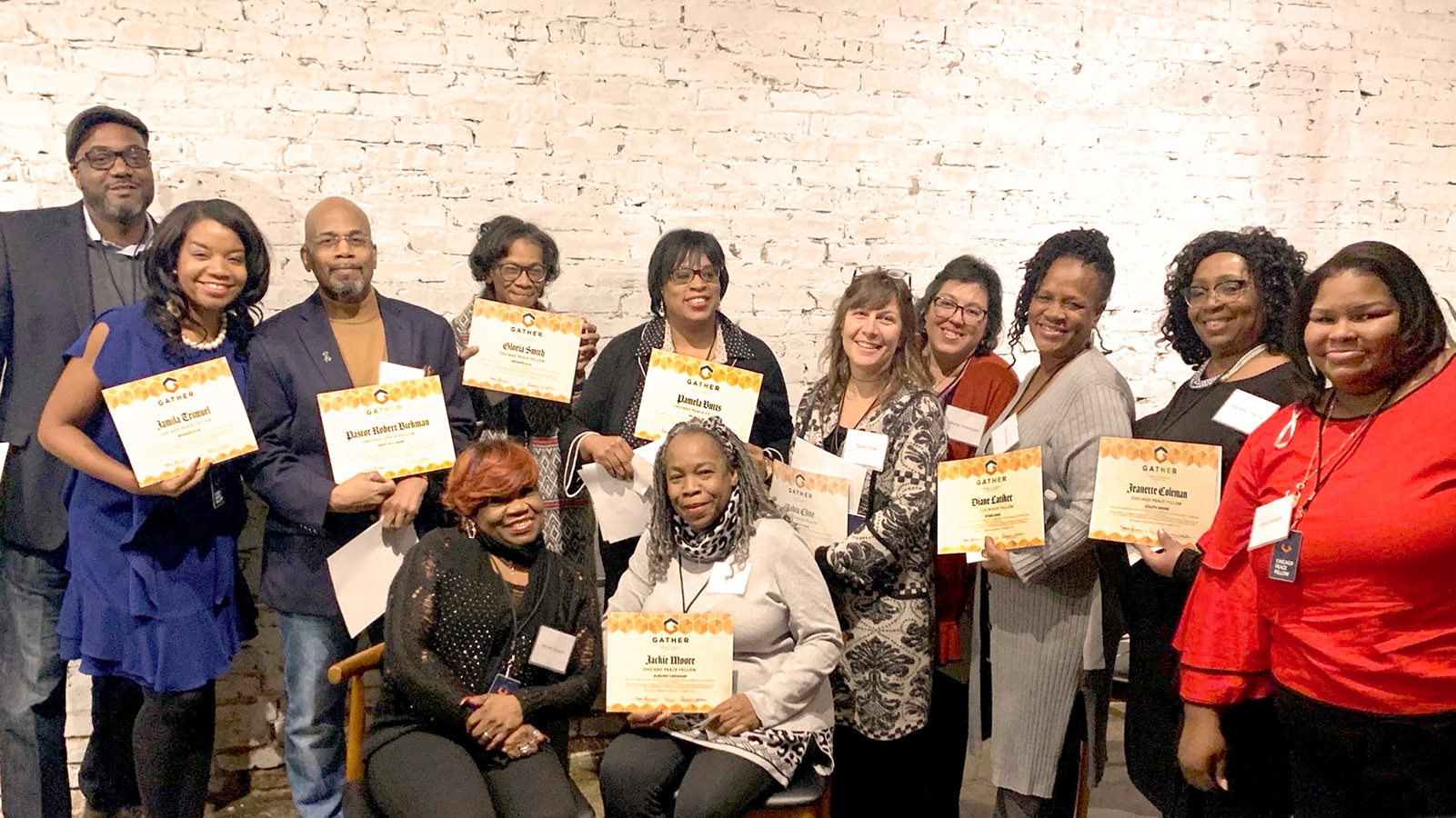Generating food, beauty and safety for neighbors in Chicago
By Yusuph Masanja, Co-Facilitator, Global Alumni Network
Goldin Global Fellow from Chicago, Robin Cline, serves as Assistant Director of NeighborSpace, the only nonprofit land trust in Chicago that preserves and sustains gardens on behalf of dedicated community groups. NeighborSpace has helped neighbors and community groups protect over 120 outdoor sites, transforming them into places where people gather to play, to grow food together, and to organize around issues in their neighborhood.
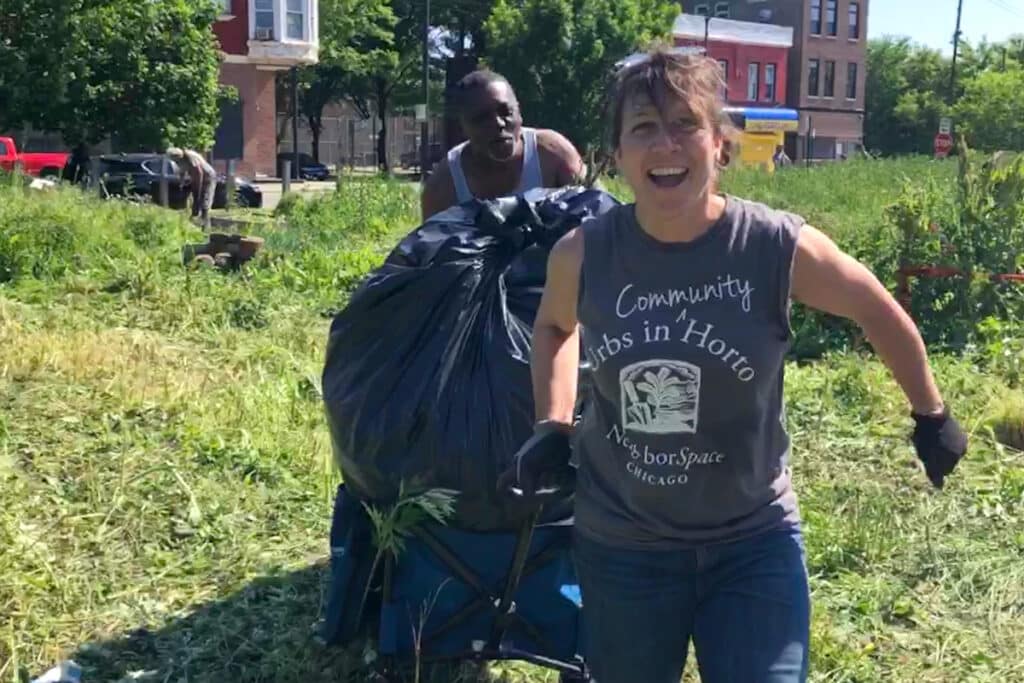
NeighborSpace continues to help community groups identify outdoor sites that can be turned into community garden spaces. They partner with early community organizations, early childhood teachers, seniors, and families in turning potential unused sites into gardens and creative gathering spaces. Especially now in the time of COVID, these outdoor spaces are more and more used as places for free haircuts, food distributions, COVID tests, and community meetings.
NeighborSpace continually works to support more growing and gathering space, and you can help with this New Year’s goal of adding 100 garden beds to NeighborSpace sites across Chicago, by visiting this Crowdfunding page to help NeighborSpace reach this goal before the 2021 growing season.
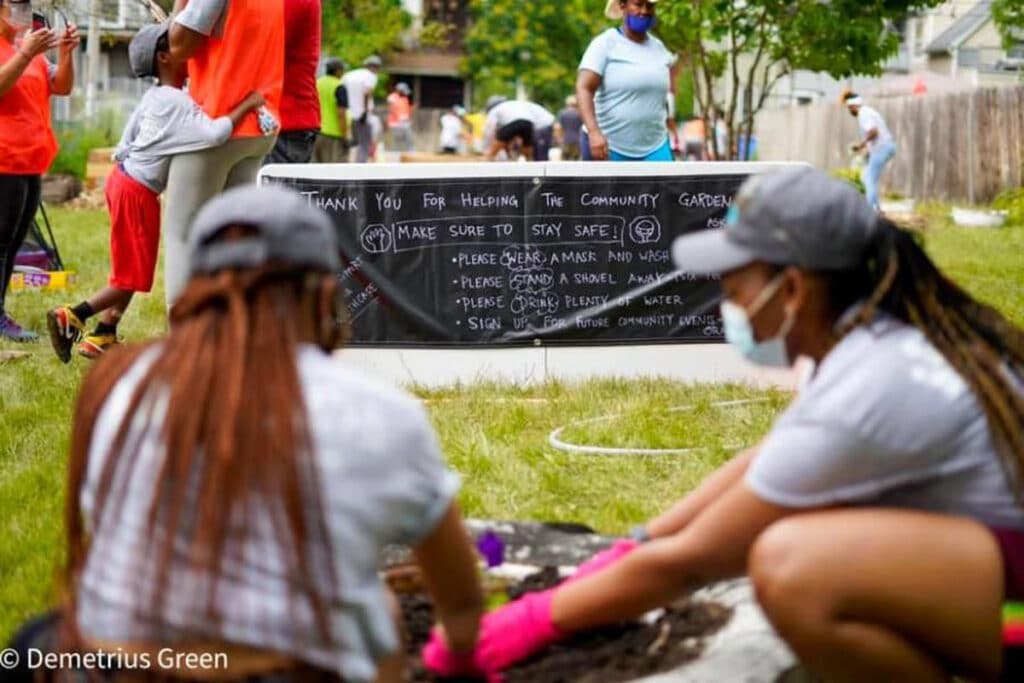
For Robin, the motivation to dive into this work comes from the goal to encourage urban people to reconnect with nature, themselves, and their community. Robin believes that if you set the right conditions for people to understand a series of processes, like that of a plant ––from seeds to fruits––it helps them understand the importance of how connected we are.
"How can we create opportunities for people to have physical connections to shared public spaces that then prompt them to have in-person connections with their neighbors?"
/Robin has recently graduated from the Visual Collaboration course which was offered by the Bigger Picture Academy. Having been inspired by this collaboration tool, she is considering applying it to support processes by which the garden leaders conduct their community building vision. Robin is mobilizing resources to provide these leaders with access to computers and the Mural application in order to learn and start using Visual Collaboration methods.
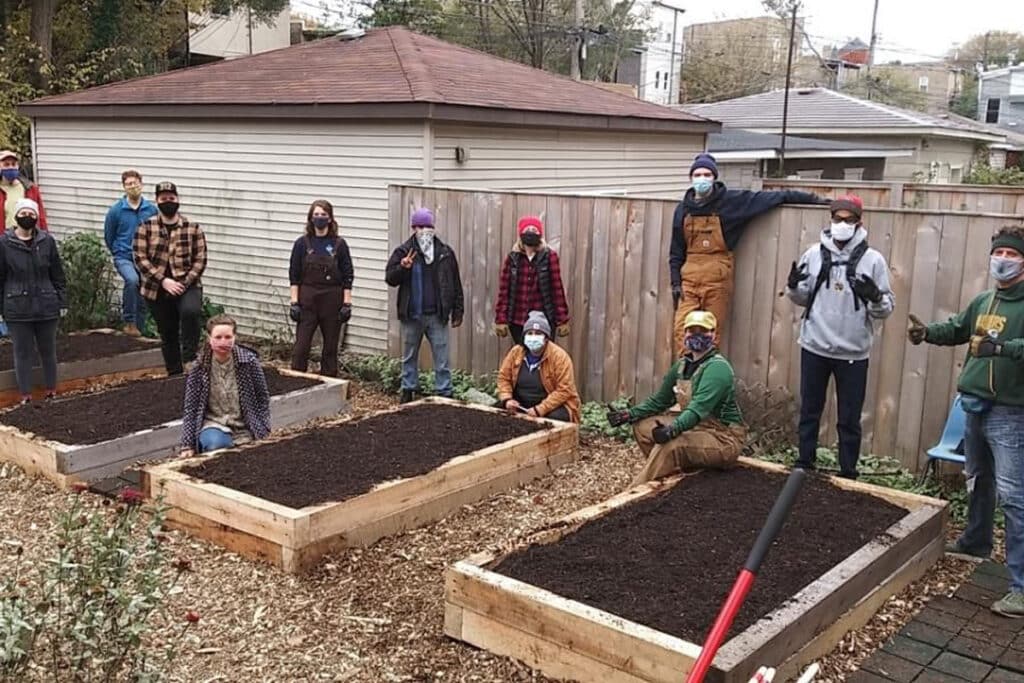
Furthermore, Robin finds inspiration from the stories of Goldin Global Fellows. The stories motivate her to keep up the good work despite challenges faced from time to time.
"Hearing other people’s stories of salvation and struggle fuels the work I am doing. We are doing non-profit work that sometimes feels invisible."
Robin adds: "The sharing of stories is so 're-storying' which is so restorative, I feel like that's an important part of the Goldin Global Fellows connection- to support each other in serving others."
Dear White Funders: I Can't Breathe Either
by Frank Latin, 2019 Chicago Peace Fellow
My name is Frank Latin and first and foremost I’m a black man. I am also the founding Executive Director of Westside Media Project, a small non-profit organization on Chicago’s West side that works to provide exposure to students (and now adults) in media/technology related fields.
I’ve been wanting to get this off my chest for a few years. Now, with the unfortunate murder of George Floyd and the ensuing worldwide protests, which have led to ongoing discussions around the topic of systemic racism, I feel this is the perfect time.
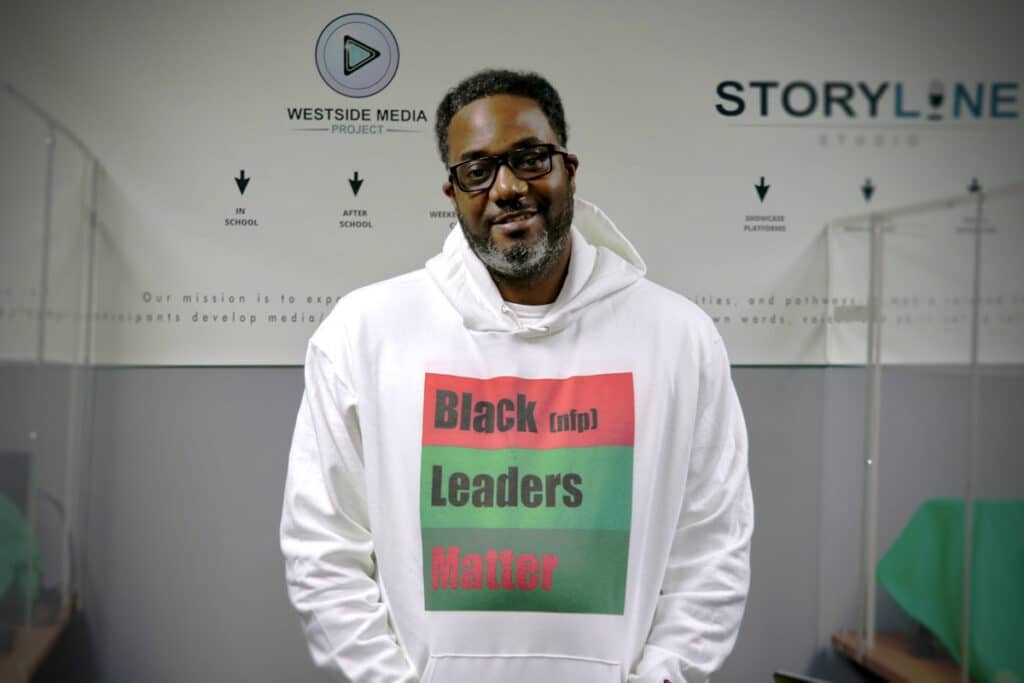
What I’ve learned in 14 years of running a non-profit is that philanthropy is one of the most racist sectors of society, competing neck and neck with the criminal justice, education and the health care systems in America. In fact, my view is that philanthropy works to bolster and prop up those other sectors by reinforcing the status quo. It is based on white society’s ‘Savior complex’ and supports white leaders at all costs, even those doing work in black and brown communities.
The perceptions I had of an uneven playing field used to upset me and have me somewhat disgruntled. However, I came to realize my perceptions were reality and have been substantiated in multiple studies, the latest published in December of 2019 by the Bridgespan Group, titled ‘Disparities in Funding for Leaders of Color Leave Impact on the Table.’
Philanthropy assumes that black and brown people living in distressed communities are part of the problem rather than part of the solution. I come to realize that as a professional, educated black man, I simply do not fit within the current model of philanthropy, primarily because I look like, walk like and talk like the residents on the west side of Chicago. The notion of a black man doing positive work in a black community without a white brain-trust or network to validate the organization is not enticing to funders. I lack what I term “white insurance” to make funders feel comfortable that their support is safe.
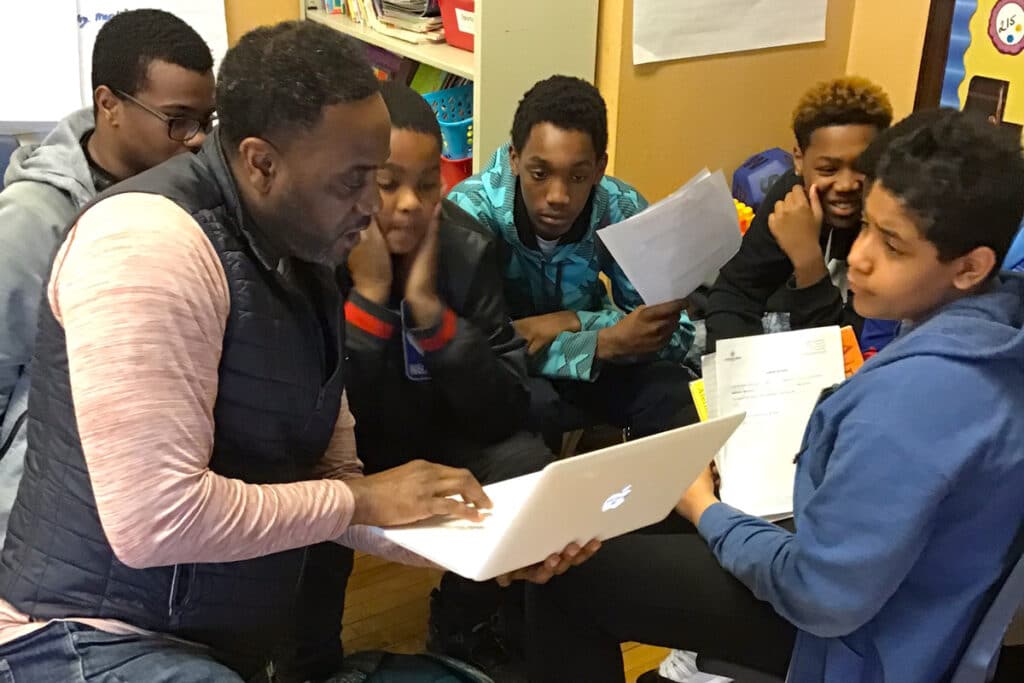
I’ll admit, when I started the organization back in 2006 I had little to no knowledge of how philanthropy worked. What I did have was a bachelor’s and a master’s degree in economics with years of experience working at a government agency so I was more than capable of learning the ropes. I decided to begin a volunteer project that eventually became something much bigger; but which I still do voluntarily.
Chicago is home to a vibrant philanthropic community and they support issues and causes not only here in the city but around the globe. However, here in the city they seldom support organizations led by leaders of color working to address those very issues, and in those instances when they do, it will rarely, if ever be at the same level shown for white led organizations doing similar work.
This has directly led to a tiered, apartheid-like structure within non-profits in Chicago where there is a huge gulf between white led organizations and those headed by leaders of color. It also perpetuates ‘culture vultures’ who seek advancement, profit and notoriety off both the misery of black and brown people as well as the structural racism that exist within philanthropy. It also encourages phony alliances in which whites who yield privilege and influence utilize people of color as fronts or tokens to gain inroads into certain communities.
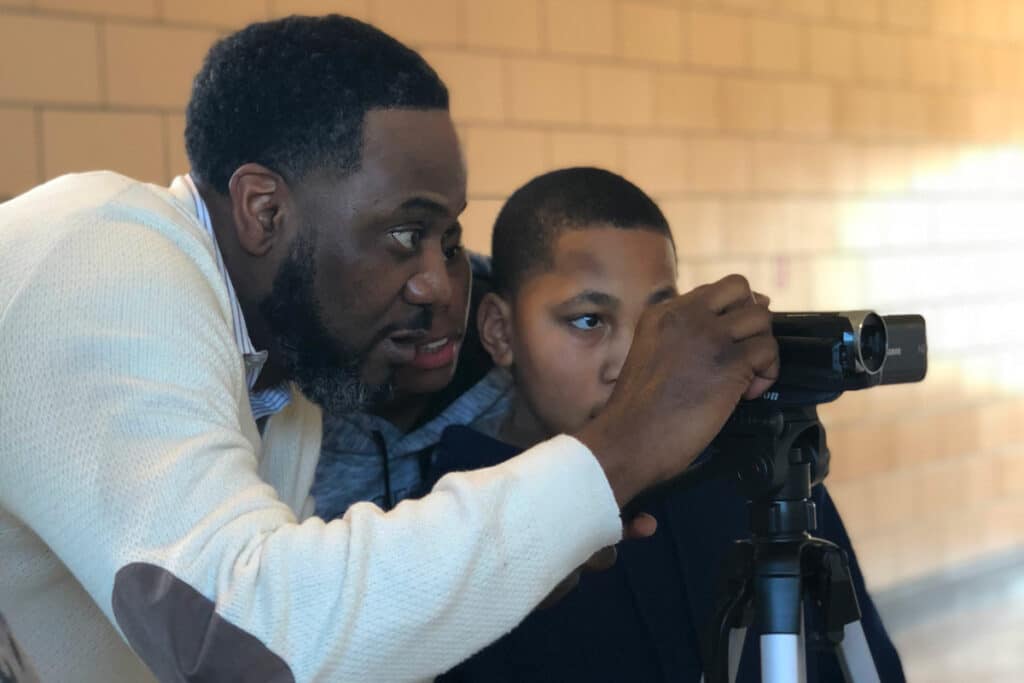
The Covid-19 pandemic has put a spotlight on the health disparities that have always existed in America. Police misconduct has been thrust back into the headlines again, and rightfully so.
Philanthropy on the other hand, is a sector that often goes unnoticed and its racist policies and practices never get splashed across the evening news or social media posts. However, the lack of funding provided to leaders of color added with the desire to prop up white leaders to do work in minority communities has devastating effects. At times, it works like a sniper, taking would-be leaders right out the field. Other times it provides a slow death, reminiscent of a choke hold or a knee to the neck not allowing organizations ran by leaders of color to service our communities.
To the philanthropic community of Chicago...I CAN’T BREATHE!!
Learn more about Chicago Peace Fellow Frank Latin's work at WestsideMediaProject.org.
Support the Mutual Aid Collaborative
Peace is Blooming in Chicago
On Sunday, May 3rd the Chicago Peace Fellows launched the Peace Flowers campaign by delivering over 75 flower bouquets to mothers that have lost children to violence.

The Peace Flowers campaign is a collective response from the Chicago Peace Fellows Mutual Aid Collaborative comprised of 38 peace organizations throughout Chicago who are working togehter to address the twin epidemics of COVID-19 and violence in Chicago.
Violence is rising in Chicago in the same south and west side neighborhoods most impacted by COVID-19 where the Peace Fellows live and work. With funding for frontline peace-building organizations often diverted to respond to the coronavirus, the Mutual Aid Collaborative is building sustainable social impact models to raise funds and create jobs.

"Peace Flowers is an innovative and easy way to fund these organizations while also investing in sustainable job creation on the south and west side of Chicago where these lovely blooms are grown."
Quilen Blackwell, Chicago Peace Fellow, Chicago Eco House

Pamela Bosley, Co-founder of Purpose Over Pain, works with mothers to connect them with each other to build a community of support.
“Many of the moms have a hard time with Mother’s Day. With the pandemic, it’s been even harder. Many mothers are reporting problems with depression and other issues related to being disconnected.”
Pamela Bosley, Chicago Peace Fellow, Purpose Over Pain
Quilen Blackwell, Owner of Southside Blooms, a social enterprise that helps youth in Englewood find opportunities in urban farming. They work to build a sense of entrepreneurship to help youth see opportunity and way out of drug trade. Quilen saw an opportunity to support Pamela’s group by providing them with beautiful bouquets in honor of Mother’s Day and to help lift their spirits. “The flower market is in huge disruption right now. 80% of flowers are imported from overseas and due to the trade issues related to the corona virus, most flowers need to come from domestic sources.” Quilen noted.

AnnaMaria Leon, Co-owner of Homan Grown, saw a collaboration in the making. She noted how this idea can be more than just a single action but, can be a part of a broader strategy to support mothers and fund projects for the Chicago Peace Fellows. She contacted her friend, Pascal Sabino, a local reporter for Block Club Chicago who wrote a powerful article about the project. The story was also featured by ABC7 in this compelling feature.
Once the funding and logistics were done, the team came together to prepare and deliver the flowers. The flowers were delivered to families across Chicago and the surrounding suburbs. The deliveries added a personal touch because they were distributed by Southside Blooms, Annamaria, and myself as Director of the Chicago Peace Fellows.
"I personally got the witness the joy and gratitude of the moms who received bouquets. It was a very moving experience to hand out flowers and cards that reminded the moms “You are not forgotten.”
Burrell Poe, Director, Chicago Peace Fellows
The deliveries were bittersweet, acknowleging the loss of family members but also because the deliveries were contact-less. No handshakes, no hugs, and at least 6ft of physical distance. Masks, gloves and hand sanitizer made this gesture different that it would have been prior to COVID-19. However, it made it all the more important because, people are suffering on top of the suffering that has already befallen their lives.
"Wonderful. Wonderful, it really made my day," said Elizabeth Bolden, a mother who received the bouquet.
The project has thus far raised over $5000 on GoFundMe and is entering into the next phase of it's social impact model where the public can purchase a subscription for flower delivery that also funds violence prevention work through the Chicago Peace Fellows Mutual Aid Collaborative.

Project oragnizers at Southside Blooms and Homan Grown will hire local youth to grow and arrange the flowers and donate a percent of their sales through the Peace Flowers campaign to support this network grassroots peace organizations on the West and South sides of Chicago plagued by the twin epidemics of violence and COVID-19.
"The goal is to create a long term sustainable funding stream for peace organizations in Chicago so that these groups have greater freedom at doing what they do best: making Chicago a more peaceful and beautiful place to live!"
Learn more about the Peace Flowers program at SouthSide Blooms
Peace Fellows Meet With Metropolitan Family Services

On Wednesday, April 8th, the Chicago Peace Fellows hosted a conversation with Metropolitan Family Services (MFS) to learn about their efforts to reduce the amount of gun violence in the city. MFS talked about three of their specific projects: Communities Partnering for Peace (CP4P), The Metropolitan Peace Academy, and Lights in the Night.
The Chicago Peace Fellows learned about the work of these interrelated projects to reduce violence, heard directly from program directors about their experiences, and explored how they can best be involved.
Communities Partnering for Peace, the Metropolitan Peace Academy, and Lights in the night are strategies meant to support community-based organizations provide on the ground services in communities across Chicago. Domonique Mccord, Director of Community Behavioral Initiatives, explained that the role of MFS in CP4P is to bring smaller community-based organizations together and provide professional services such as accounting, human resources and mental health services that would be difficult for street outreach organizations. MFS provides these services to organizations across the city.

The Chicago Peace Fellows also learned about the Metropolitan Peace Academy which seeks to professionalize street outreach and create a learning institution to share best practices across organizations. Vanessa Dereef, Director of the Metropolitan Peace Academy, shared that it is important for outreach workers to build relationships to support one another across the city. Several Chicago Peace Fellows were familiar with the Lights in the Night program which runs programs at night in public places over the summer. Several Fellows have participated in these activities and learned more about how they can be involved.

The Chicago Peace Fellows were really interested in how they can support the activities of MFS and be involved as community leaders in street outreach. Steve Perkins, Director of Outreach, explained that they can learn more about the street outreach organizations in their neighborhoods and share information when it’s appropriate. He encouraged fellows to participate in community activities and to get to know the people in their neighborhoods.
Violence as an Adaptive Challenge
On Thursday, March 26, the Chicago Peace Fellows participated in a workshop titled ‘Violence as an Adaptive Challenge’ with staff members at the University of Chicago Medical Center’s Violence Recovery team. This is the second workshop in the GATHER course, and the Fellows discussed issues related to solving complex, amorphous problems in the communities they serve. They were joined by staff at the University of Chicago Medical Center for Community Health and Vitality, who shared useful information about staying safe from COVID-19 and answered the Fellows’ questions relating to how they can protect themselves and their neighbors. Due to the social distancing efforts going on in Chicago to stymie the spread of COVID-19, this workshop was conducted online via video conference software.

The Violence as an Adaptive Challenge workshop was conducted with the Violence Recovery team at the University of Chicago Medical Center. They started the call by explaining their role in the trauma center, which is to connect with victims of intentional violence, i.e. gunshot wounds, knife attacks and other injuries that come to the trauma center. When they connect with victims, they try to find resources in the hospital and community to help solve other problems they may have besides their injury such as housing, food insecurity or mental health. The program is meant to deal with what they call the Social Determinants of Violence so as to keep people from having to come back to the hospital. The program has been in operation for almost 2 years and started when the Level 1 trauma center opened in May 2018. They explained that they are one of the few violence recovery teams in the nation.
The Peace Fellows asked questions about how their operation works in the trauma center and how successful their work has been. The Fellows also asked about how their work connects with community-based organizations to provide a network of support for the individuals that come into the hospital’s care. The Fellows inquired about how they could collaborate with various community institutions such as the Chicago Police Department. The Fellows shared the various services they provided and offered to support the violence recovery team. Many of the violence recovery specialists are members of the community who have similar backgrounds to many of the victims of violence, particularly gun violence.
“One of the things we are big in is preventing reinjury [victims coming back to the trauma center with new injuries] risk,” explained Dre, a violence recovery specialist. “That starts as soon as they get in. We work to understand if they are in danger or if it is an ongoing situation.”
To round out the call, the Peace Fellows spoke with Dr. Doriane Miller, director of the Center for Community Health and Vitality. Dr. Miller explained basic information that community members need to know about the symptoms of COVID-19 and how the virus is transmitted. The Fellows asked questions and dispelled myths about who can contract the virus and whether certain home remedies are effective.
Please visit the University of Chicago Medicine website for more information. Or visit the City of Chicago COVID-19 Portal.
Meet the 2020 Chicago Peace Fellows
The Goldin Institute invites you to learn about each of our 2020 Chicago Peace Fellows representing 14 community areas across the city. Founded in 2019 in collaboration with the Partnership for Safe and Peaceful Communities, the Chicago Peace Fellows program is the only leadership development program that is built by and for grassroots community leaders on the South and West sides of Chicago.
Peace Fellows participate in GATHER, an online asset-based community engagement course, as well as in-person training, collaborative action projects, and networking experiences with civic leaders, academic researchers, and policy makers. The Chicago Peace Fellows reduce violence by building relationships, engaging youth, collaborative peace building projects over the summer and by creating new networks among residents, families, schools, and nonprofit organizations.
ABOUT GATHER
The Fellows are learning together through GATHER, which is both a mobile platform for shared learning and a curriculum for people who want to build on the talents of their neighbors and the assets of their communities to make real and lasting change. Gather Fellows learn and work together through an innovative curriculum that comes pre-loaded on a tablet device with all the connectivity, materials, videos, practices and tools necessary to provide a mobile classroom and toolkit for community leadership.
The Chicago Peace Fellows project will connect and equip a select group of past grantees of the Chicago Fund for Safe and Peaceful Communities to reduce violence and promote peace. Chicago Peace Fellows will be the second all-Chicago cohort to utilize the GATHER platform, an online learning hub built by the Goldin Institute to empower grassroots leaders.
The participants have been selected from past grantees of the Chicago Fund. They will engage in a 14-week course of intensive shared learning as well as group projects, culminating in a graduation event in October, 2019. The curriculum has been designed in collaboration with the grantees themselves, based on their practical knowledge and hard earned wisdom, with input from a wide range of civic leaders. Fellows will reflect on their past summer work, identify successes and lessons learned, and improve their abilities by sharing strengths and learning new skills.
The Goldin Institute and the Partnership for Safe and Peaceful Communities have aligned missions that value authentic community leadership. The Chicago Fund is uniquely effective at finding motivated problem-solvers and community-builders. By connecting Chicago leaders through GATHER, their efforts to nurture safer and more peaceful communities will be more effective, interconnected and lasting.
A special thanks to the Conant Family Foundation, JP Morgan Chase, the Polk Bros. Foundation, Crown Family Philanthropies and the Partnership for Safe and Peaceful Communities for making this program possible.
To follow along the learning journey with the Gather Fellows, please sign up for our newsletter and follow up on Twitter, Facebook and Instagram.
If you would like to apply for the next cohort of Gather Fellows, please visit apply.goldininstitute.org.
A Night to Remember!
By Frank Latin, Senior Advisor, Communications
For me, the Goldin Institute’s 2019 Chicago Peace Fellows graduation ceremony was an inspiring event. The ceremony marked the completion of a six-month fellowship in which myself and 18 other committed community leaders collaborated to complete an engaging, community-focused curriculum and attend other scheduled workshops. The Chicago Peace Fellow program, with the use of its GATHER platform, is designed to share new social change tools and concepts that can assist in creating safer and more peaceful communities with individuals who already working in high-need areas on the South and West sides of Chicago.

The event attracted close to 100 people, including family, friends, colleagues and civic leaders who showed up to acknowledge the collective work of the CPF graduates. The group is comprised of individuals who lead small organizations and do not allow our even smaller budgets to deter us from doing the work that our communities so desperately need.

Our budgets and our organizations are small, but our work has a huge impact in the communities we serve.
To be honest, it was a pleasant surprise to see so many people come out to honor the work of a small group of people whose work often goes unnoticed by the mainstream. The evening came full circle for me when I ran into an old colleague at the event, Susana Vasquez, who I hadn’t seen in a while. Susana volunteered to conduct our first strategic planning session over 12 years ago. The mission and vision we crafted back then has helped guide me to this point...And here we are, the Westside Media Project is now in its 14th year of engaging and empowering community residents to utilize digital media to tell their own stories.

In the end, the ceremony not only celebrated the work of the 2019 Chicago Peace Fellows, it also highlighted one of the core beliefs at the Goldin Institute that is not universally shared throughout the philanthropic community: Leaders of color who live in the communities in which they serve are more than capable of providing solutions to problems that exist in their communities.
The Goldin Institute thanks the Conant Family Foundation, the Polk Bros. Foundation, Chase Bank, the Partnership for Safe and Peaceful Communities and our generous network of champions for community driven social change for supporting the Chicago Peace Fellows
Download the Graduation Booklet to Learn More
2019 Chicago Peace Fellows Report
For nearly two decades, the Chicago-based Goldin Institute has worked to build the capacity and amplify the voices of grassroots organizers in communities contending with the most challenging circumstances on Earth. In late 2018, the Goldin Institute was asked to design a course for grassroots organizers by the Partnership for Safe and Peaceful Communities, a coalition of 40 Chicago-based foundations who are aligning their investments to support proven and promising approaches to reducing gun violence. The Goldin Institute relied on its extensive global experience to create the Chicago Peace Fellows.
The Peace Fellows is a curriculum and fellowship designed to support individual organizers who are prior grantees of the Partnership’s Chicago Fund and are working to stop violence and create opportunities for their neighbors to collaborate in promoting more peaceful communities across the city. The inaugural class of 18 Peace Fellows graduated in November 2019 after more than six months of collaborative learning and joint projects.

The Goldin Institute designed the Peace Fellows course in collaboration with previous Chicago Fund grantees and input from a wide range of civic stakeholders. Based on the advice they received, staff adapted GATHER, the Goldin Institute’s tablet-based curriculum that teaches a series of core social change concepts and tools for authentic community engagement for grassroots leaders across the globe, to fit the newly formed group of local neighborhood changemakers, enhancing the online course with in-person workshops and meetings with a wide range of civic leaders in Chicago.
The 18 Chicago Peace Fellows were selected from a pool of over 50 applicants who all live and work in community areas on the city’s South and West sides that are disproportionately affected by crime and violence. Each Peace Fellow received a stipend and an iPad pre-loaded with the GATHER software and curriculum. Connecting Chicago leaders through GATHER allowed Fellows to explore key concepts around social change and leadership development digitally while they continued playing key roles in their community organizations as they completed the course.

On March 8, 2019, the Peace Fellows convened at DePaul University for the launch of the program where they discussed their leadership styles and got to know their peers. Over the following several weeks, the Chicago Peace Fellows developed deep bonds and determined together the principles and practices that would enable them to learn and work together as a community of practice.
The experience continued through the exercises in the curriculum and a wide variety of in-person workshops highlighting key violence prevention skills and introductions to other organizations doing important violence prevention work in the city. Fellows also had access to elected officials and institutional leaders in Chicago and beyond.

Throughout the program, Fellows participated in over 50 events and workshops hosted by partner organizations, including:
- The City Club of Chicago presentation on Crime and Criminal Justice in Chicago led by Professor Jens Ludwig of the University of Chicago Crime Lab.
- A meeting with the Violence Interruption Team at the University of Chicago Trauma Center.
- A conversation with author Edgar Villanueva about his book, “Decolonizing Wealth.”
- A conversation with Chicago artists on the Role of the Arts in Social Justice followed guided tour of the Chicago Cultural Center exhibit by Cecil McDonald, Jr.
- An Asset Mapping workshop with John Zeigler of the DePaul’s Egan Center and the Asset Based Community Development Institute.
- A workshop on appreciative inquiry followed by a guided tour of the Garfield Park neighborhood with the outreach team at Breakthrough Ministries.
- A presentation by Chicago Police Department Superintendent Eddie Johnson with a question and answer session.
- An overview of Chicago’s broader strategy to prevent violence and a conversation with the violence prevention team at the Institute for Nonviolence Chicago.
- Exploring opportunities to collaborate with the Chicago Park District over the summer.
- Conversation about the Role of Race and Representation in Violence at the Field Museum of Chicago featuring a tour of the “Looking At Ourselves” sculpture exhibit.
- A conversation with Alderman Walter Burnett about collaboration with civic leaders and city agencies.
- Exploration of the Role of Urban Planning and Civic Design in Peacebuilding at the Stony Island Arts Bank in collaboration with Studio Gang.
- Conversation about the importance of evaluation and data with the University of Chicago Crime Lab.
- A visit to Indiana to meet with the 10 Point Collaborative in Indianapolis, a local initiative to prevent violence.

These face-to-face meetings augmented the curriculum Fellows explored together using the GATHER digital platform specifically designed to enact the course’s pedagogy of learning as a community. Rather than a traditional teacher-to-student course, GATHER is made up of highly interactive chapters that guided Fellows through key concepts for social change. It then provided them space for shared reflection after they put those techniques into practice in low-stakes exercises with peers and assignments.

Towards the end of the curriculum, the Fellows planned and implemented community projects within their neighborhoods. The Goldin Institute assembled $30,000 in special funds for the Peace Fellows to execute these collaborative projects between July and September with the goal of involving community residents, creating peace, and promoting healing.
The planning process for the summer projects was likewise collaborative, beginning with the establishment of principles based on the key concepts explored during the GATHER course. The Fellows generated a wide variety of ideas together which they took back to their communities and organizations, and went through several more levels of review before they proceeded on the allocation of the funds. Moving in concert, the Fellows settled on eight summer projects, deciding how to fund each project with the $30,000 pool, acting as grant-maker as well as grantee.

Innovative, enlightening, powerful, sometimes spiritual and deeply emotional, the summer projects included an outdoor youth retreat that brought young people from different neighborhoods to an activity camp in the Wisconsin forest, a family and youth peace day in Bronzeville, a healing fair for senior citizens with yoga, tai chi and peace circles, and Passport to Peace events in parks and public spaces on the city’s South and West sides.

The 18 Peace Fellows graduated from the course on November 14, 2019, in a ceremony that they designed collaboratively, of course. Approximately 100 family, friends and supporters came out to celebrate the Fellows’ accomplishments.
The Goldin Institute’s Founders, Board Chair Diane Goldin and Executive Director Travis Rejman, welcomed the Peace Fellows to the Institute’s global community of practice, adding that the program brought home to Chicago everything they had learned around the globe.

“Over the past 17 years working in over 50 countries, we’ve seen that real and sustainable change is always rooted in the power of communities building on their assets and inviting voices people on the front lines to make decisions,” Travis said.
The Fellows took the opportunity to share “What they did,” “What they learned,” and “Where they are going.” In groups of 4-5, the Fellows relayed the most meaningful moments of their time together and inspired all those in attendance with their passion as well as the kinship and respect they had come to feel for each other.

“We all come from different points in life and we got to hear from people using resources and what they know in their communities to make a difference,” said Peace Fellow Frank Latin, founder and executive director of the Westside Media Project. “We all come together regardless of our backgrounds and what we’ve been through to try and make a better place to live.”
A 12’ long graphic timeline hung in the graduation space displaying all the events the Fellows had attended and all the workshops in which they had participated, illustrated with pictures from their highly successful summer projects.
Upon their graduation, the Peace Fellows officially joined a growing network of Global Gather Fellows currently representing 14 countries in Africa, Asia, Europe, the Middle East and North and South America. They have access to an international network for mutual support, ongoing learning and global cooperation.
Systemic and adaptive challenges facing our communities will require new approaches to see and change the system by building on our local assets and unlocking the potential of emerging leaders. To address these dynamic issues, the GATHER Global Alumni network meets online each month for workshops and discussions on themes selected by the alumni themselves. Recent workshops have included trainings on metrics and evaluation; children and armed conflict; and preventing violent extremism.
The overwhelmingly positive response from the inaugural cohort of Chicago Peace Fellows has inspired the Goldin Institute and the Partnership for Safe and Peaceful Communities to expand the Peace Fellows program in 2020.

The Goldin Institute thanks the Conant Family Foundation, the Polk Bros. Foundation, Chase Bank, the Partnership for Safe and Peaceful Communitiesand our generous network of champions for community-driven social change for their support of the Chicago Peace Fellows.
The Goldin Institute extends its deepest appreciation to the following organizations and groups who provided critical assistance, hosted workshops, collaborated on peace building projects and shared insights to make the Chicago Peace Fellows an inspiring and productive experience:
2016 Ma’at, Academy for Global Citizenship, Alliance for the South East, Agape Werks, Asset Based Community Development Institute, Atonement Church, Automotive Mentoring Group, Be Different, Black Star Project, Blocks Together, Breakthrough Urban Ministries, Bright Star Church, Brothers Standing Together, Chase Bank, Chicago Alternatives to Incarceration Collaborative, Chicago Cares, Chicago Community Trust, Chicago CRED, Chicago Cultural Center, Chicago Foundation for Women, Chicago Knights Robotics Team, Chicago Park District, Chicago Police Department, Chicago Public Libraries, Chicago Women’s AIDS Project, Chicago Youth Programs, CIGNA, City Bureau, City Club of Chicago, City Colleges of Chicago, Chopin Theater, Churchview Senior Living Facility, Community Builder, Conant Family Foundation, Crossroads Fund, Cure Violence, CNI Group, Crown Family Foundation, CWAP, Darren B. Easterling Center for Restorative Practices, David Lynch Foundation, DePaul University, DePaul University Egan Office of Urban Education, DePaul University Steans Center, GodTess, Graphics 2020, Grow Greater Englewood, Healing Home, Heartland Alliance READI Program , I Am My Brothers Keeper, Imago Dei, Imani Community Development Corporation, Institute for Nonviolence Chicago, Kids Off the Block, King of Glory Tabernacle, Ladies of Virtue , MacArthur Foundation, Maple Park Community Association, Maple Park UMC, Marion Nzinga Stamps Youth Center, McCormick Foundation, Metropolitan Family Services, Metropolitan Peace Academy, Metropolitan Planning Council, Mikva Challenge, Missionary Baptist Church , M.I.T. School of Urban Planning, NeighborSpace, New America Foundation, New Eclipse Community Alliance, Northeastern Illinois University, OperaMatic, Partnership for Safe and Peaceful Communities, Phoenix Life Solutions, PNC Bank, Polk Bros. Foundation, Precious Blood Ministry of Reconciliation, Project, R.A.G.E., Rebuild Foundation, Resurrection Project, Restore Justice Illinois, Stony Island Arts Bank, Studio Gang, Taylor Investment Partners, Teamwork Englewood, Technology for Social Good Lab, Ten Point Coalition, Indianapolis, Telpochcalli Community Education Project, ThinkInc., TREAD, UCLA Department of Black Studies, United Way, University of Chicago Crime Lab, University of Chicago Law School, University of Chicago Trauma Center, University of Illinois, Urban Labs, US Bank, Veterans for Peace, Westside Justice Center, Westside Media Project, Woods Fund, Young Chicago Authors.
Special acknowledgment to those partners, mentors, consultants, friends and colleagues whose ideas and expertise made the Chicago Peace Fellows possible:
Marshan Allen, Michael Aguhar, Daniel Ash, Shannon Barr, Abraham Bendheim, Chris Bennett, Deborah Bennett, Esteban Bey, Mecca Bey, Gia Biagi, Garenne Bigby, Quincy Bingham, Eddie Bocanegra, Vaughn Bryant, Mary Scott-Boria, Bliss Brown, Walter Burnett, Asiaha Butler, Elena Calzada, Jacob Campbell, Annmarie Chereso, Linc Cohen, Daniel Cooper, Kevin Coval , Tara Dabney, Vanessa Dereef, Katherine Elmer-Dewitt, Stacy Erenberg, Jessa Dickinson, Alejandro DiPrizio, David Doig, Anders Donskov, Lisa Dush, Leif Elsmo, Kahil El’Zabar, Sheena Erete, Derrick Faulkner, Gary Feinerman, Ghian Foreman, Christian Forman, Craig Futterman , Theaster Gates, Joseph Genslak, Teny Gross, Janet Hanley, Troy Harden, John Hardy, Nekenya Hardy, Charles Harrison, Damion Heron, Jeffrey Hodges, Khari Humphries, Shruti Jayaraman, Frankie Johnson, Tonika Johnson, Terence Keel, Jody Kretzmann, Teddy Krolik, Rebekah Levin, Keith Lewis, Eric Ljung, Dan Lurie, Kristen Mack, Mallory McClaire, Cecil McDonald, Ceasar McDowell, Delano McIntyre, Tawa Mitchell, Michelle Morales, Sheelah Muhammad, Amalia Nieto-Gomez, Mark Orthman, Ashley Perkins, Jobi Peterson, Christy Prahl, Julian Posada, Tony Raggs, Leslie Ramyk, Kim Redding, Robert Rejman, Raymond Richard, Art Richardson, Jose Rico, Robin Robinson, Jane Saks, Anton Seals, Kimberly Smith, Alexis Smyser, Rahmaan Statik, Justice Stamps, Arny Steiber, Ole Qvist-Sorensen, Arloa Sutter, Bruce Taylor, Tess Torziata, Susana Vasquez, Edgar Villanueva, Cortez Watson, Alaka Wali, Artimmeo Williamson, John Wolf, Lora York, John Zeigler.
Celebrating the Achievements of 2019
By Ethan Michaeli, Senior Advisor
Happy New Year from the Goldin Institute! 2019 was a momentous year with the debut of the Chicago Peace Fellows, our fellowship for grassroots organizers in our home town, and numerous accomplishments for the international graduates of GATHER, our integrated curriculum and tablet-based software.
Below we’ve created a month-by-month timeline with links to articles celebrating the achievements of 2019.
We’re certain you’ll agree it was a momentous year for all of our partners, and we’re so grateful for your support and attention. Thank you for sharing the journey with us:
January - The year began with a conversation with key civic leaders and community stakeholders who helped shape the Chicago Peace Fellows program to be a truly unique approach that would provide training and resources as well as an expanded network to organizers working in city neighborhoods contending with disproportionate levels of crime and violence.
Malya Villard-Appolon, a Global Associate at the Goldin Institute based in Haiti who co-founded KOFAVIV, the Commission of Women Victims for Victims, wrote a moving reflection on the decade since an earthquake devastated her homeland.
February - We published an array of commentaries to mark International Women’s Day. Cynthia Austin, a California-based graduate of GATHER, wrote about her work empowering survivors of sexual violence and trafficking. GATHER alumnus Michelle Kuiper related her experiences getting legislation passed in her state of Kentucky, while Uganda-based GATHER graduate Diana Alaroker described teaching women and girls in a region recovering from civil war.

The founder of the Goldin Institute, Diane Goldin, reflected on 16 years of collaboration with grassroots leaders and especially on the foundational role of women in our work.
The same month, Jimmie Briggs, the Goldin Institute’s coordinator for community learning and collaboration, led an online training for all the GATHER alumni on fundraising.
GATHER alumnus Geoffrey Omony, the founder of Youth Leaders for Restoration and Development (YOLRED), the first organization in Uganda designed and run by former child soldiers, and Global Research Fellow Jassi Sandhar released a graphic novel about the lives of young people in the Gulu region who were forced to become participants as well as victims of the long-running civil war.

March - The month began with “Confessions of a Rebel Architect,” a provocative essay from Goldin Institute Chief of Staff Oz Ozburn calling for a greater sense of social responsibility in her profession.
Just a few days later, we announced the names of the Peace Fellows, 18 community leaders from 14 different neighborhoods who had gone through an extensive application process and were committed to learning together and intervening in the violence that impacts too many of Chicago’s families.
The Peace Fellows hit the ground running, using the tablets with the pre-loaded GATHER software for their on-line lessons, but also coming together in person to absorb the principles of the course and share their own expertise.
In the middle of the month, the Fellows attended the City Club of Chicago’s conclave on Crime and Criminal Justice and then later did a group tour of the University of Chicago Hospitals’ Trauma Center, where they met with staff and discussed new strategies to promote healing and recovery as well as the interruption of violence.
The Peace Fellows capped off their first month with their first online group meeting with the international graduates of GATHER, a workshop with Rebekah Levin, director of evaluation and learning with the Chicago-based Robert R. McCormick Foundation.
April – At the beginning of this month, the Peace Fellows continued their work on evaluation by participating in a presentation with another longtime Goldin Institute ally, DePaul University Professor Lisa Dush, who is conducting a formal evaluation of the GATHER software.
To study how art and social justice can inform and strengthen each other, the Peace Fellows met with artists Tonika Johnson, Jane Saks, Rahmaan Statik and Cecil McDonald.

Individual Peace Fellows took the initiative to host their peers. Alex Levesque at the Automotive Mentoring Group invited the other Chicago Peace Fellows to visit his organization to determine the principles and practices that empower shared learning.
The Peace Fellows are all veteran community organizers, and Dr. Sokoni Karanja shared his thoughts about the program and his connections with the other Fellows.
In the middle of the month, the Fellows came together to share asset maps of their communities that include all of the leaders, informal institutions and other resources.
Peace Fellow Jeannette Coleman, director of I AM MY BROTHER’S KEEPER UNITY DAY, a not for profit community outreach program in the South Shore neighborhood on Chicago’s South Side, wrote about the history of her organization and about the positive alternatives they provide for young people.
The circle of advisors the Goldin Institute assembled at the end of the month to review the Peace Fellows’ progress.
May – The Peace Fellows began the month by touring Breakthrough Ministries, a facility on the West Side working with people returning from prison. Program Coordinator Burrell Poe wrote that the Fellows met on site to learn about Appreciative Inquiry, an essential technique the Goldin Institute has employed successfully with its fellows all around the globe.
To help them amplify their voices in civic affairs, they attended another City Club of Chicago luncheon, this time featuring Chicago Police Department Superintendent Eddie Johnson.
In the middle of the month, Peace Fellow Robert Biekman, a pastor on Chicago’s South Side, authored a personal essay in which he described his personal experience with the curriculum, which had increased his personal capacity as a leader as well as the capacity of his organization, the Chicago Alternatives to Incarceration Collaborative.
Delasha Long, the Goldin Institute’s Media and Content Specialist, profiled Peace Fellow Jamila Trimuel, who hosted the 2019 Recognition Ceremony to honor high school and eighth grade graduates involved in her innovative, highly recognized program Ladies of Virtue.
Among the international alumni of GATHER, a special honor was accorded to Jamal Alkirnawi, CEO of a New Dawn in the Desert, a Bedouin-Jewish organization in Rahat, Israel. Jamal was named as one of 12 prominent torch lighters for Independence Day in Israel.
At the end of the month, the Peace Fellows came together for a powerful meeting with the staff of activists at the Institute for Nonviolence Chicago, who are teaching non-violence techniques in some the neighborhoods most impacted by gun violence.
June – Peace Fellow Gloria Smith reflected on her unique path to becoming executive director of the Black Star Project based in Chicago’s South Side. Smith took the helm of the Black Star Project after her brother, the organization’s founder, passed away.
In a dispatch from Uganda, Geoffrey Omony described the ‘Community Parliaments’ YOLRED organized to create a space for discussion, truth and healing in his community.

GATHER Alumnae Cynthia Austin wrote an essay to celebrate the first anniversary of Shyne, the organization she founded to help survivors of sex trafficking build safe and productive futures in San Diego and other parts of Southern California.
Peace Fellow Robin Cline, assistant director of NeighborSpace, wrote about exciting new concepts to reform philanthropy and make more resources available to those working at the grassroots.
In the remote, impoverished town of Mthatha, South Africa, Dieudonne Allo shared excited news about being selected for the 2019 Red Bull Amaphiko Academy and about new partnerships between his organization, the Global Leading Light Initiative, and other GATHER alumni in Chicago and San Diego.

Peace Fellow Maria Velasquez hosted her peers at the Telpochcalli community organization, which is based in the Telpochcalli Elementary School in Little Village, a neighborhood with a high percentage of Spanish-speaking residents and immigrants from across Central and South America.
The Peace Fellows conducted a series of meetings with key institutions to assess how they could establish partnerships to reduce violence in the city’s neighborhoods. The Fellows spoke with top officials at the Chicago Park District to discuss how that agency is using its facilities and staff around the city. At the Field Museum of Natural History, they were invited to inspect and comment on a controversial exhibit that is being revised to reflect current standards as well as its historical legacy.
July – Sokoni Karanja wrote about the Family and Youth Peace Day, one of eight summer projects the Peace Fellows collectively planned and funded. More than 200 people came out to the event in the Bronzeville neighborhood for positive activities.
The Peace Fellows returned to the Institute for Non-Violence Chicago for a specialized, intensive training session in Non-Violence as it was practiced by Martin Luther King Jr.

Continuing their discussions with civic leaders, the Peace Fellows met with Ald. Walter Barnett, one of the Chicago City Council’s veterans and a principle advocate of new approaches to stopping violence in the city.
In the interest of discovering best practices across the Midwest, the Peace Fellows visited an innovative anti-violence program in Indianapolis.
Late in the month, the Peace Fellows presented their progress through the course, and their plans for summer projects to staff and grantees of the Partnership for Safe and Peaceful Communities, a grant initiative that pools funds from multiple area philanthropies to try and obviate violence in the city.
Finally that month, the Fellows attended “Black and Brown Lives in Green Spaces: Race and Place in Urban America,” a panel discussion at the DuSable Museum.
August – GATHER alumni Lissette Mateus Roa from Colombia, and Diana Alaroker and Geoffrey Omony from Uganda led an online conversation about mitigating trauma for former child soldiers with the other GATHER alumni as well as the Chicago Peace Fellows.
Peace Fellow Jeanette Coleman recounts the experiences she had during the Youth Exchange, a summer project which brought together teenagers from different Chicago neighborhoods together for an overnight retreat in a Wisconsin forest.

Peace Fellow Gloria Smith described the robust on-line discussion with Edgar Villanueva, author of “Decolonizing Wealth.” Villanueva’s ideas for a major overhaul of the priorities and procedures of major philanthropies found a receptive audience among the Peace Fellows and GATHER alumni.
In addition to meeting on-line with the GATHER alumni, the Peace Fellows toured additional sites and institutions in Chicago to expand their network and amplify their voices. At the Rebuild Foundation's Stony Island Arts Bank, they met with Studio Gang's Urbanism and Civic Impact team to explore the Role of Urban Planning and Design in Peace-building and Violence Prevention. A few days later,the Fellows toured the University of Chicago Urban Labs to learn more about the work of the Crime Lab.
September – Early in the month, GATHER alumnus Michelle Kuiper led an on-line discussion on women’s issues with GATHER’s global alumni as well as Chicago Peace Fellows.
Program Coordinator Burrell Poe reported on the Passport 2 Peace events, which were part of the Peace Fellows’ collaborative projects. Fellow Robert Biekman, who hosted one of the events in his neighborhood park, described a fun-filled day that drew hundreds of residents for activities focused on healing and development.
With the Peace Fellows moving into the final phase of the program, the Goldin Institute convened the civic leaders who have served as a circle of advisors and reviewed the Fellows’ progress.
In Cameroon, GATHER alumnus Alexander Gwanvalla hosted a workshop on how to build on community assets for grassroots leaders of Nsongwa Mile 90, an area with high levels of recruitment of child combatants and separatist fighters.
Lo Ivan Castillon, a GATHER alumnus based in the Philippines, sent an update on the organization he founded, the Volunteers’ Initiatives in Bridging and Empowering Society (VIBES), which is involving young people in various projects all designed to rebuild and heal a region that his wracked by civil war and natural disasters.

At the end of the month, GATHER alumnus Dieudonne Allo from South Africa stopped in Chicago during his American tour, and met with Peace Fellow Jacquelyn Moore to plan their youth robotics projects. Dieudonne’s visit fortuitously coincided with the arrival of Ceasar McDowell, a professor at the Massachusetts Institute of Technology who has been a senior advisor to the GATHER program since it was first conceived. Ceasar was in town to give an inspiring lecture at Depaul University entitled “Dialogue in Demographic Complexity: Overcoming Our Discriminatory Consciousness.”
October – Goldin Chief of Staff Oz Ozburn wrote about a partnership between the Peace Fellows and DePaul University's Technology for Social Good Lab to create a city-wide “Living Asset Map” which will connect grassroots leaders with a range of civic institutions dedicated to peace building.
This month also saw the fruition of the Goldin Institute’s partnership with the Voices & Faces Project and Brothers Standing Together, an organization founded by GATHER alumnus Raymond Richard, to lead “Testimony & Transformation: A Writing Workshop for Returning Citizens.”

In a special report from Kenya, Gather Alumnae Mariam Ali Famau announced the launch of Women of Faith in Action, a new program to stop the recruitment of children into armed conflict. A single mother herself, Mariam teaches young women self-empowerment and entrepreneurship in a community where there are perilously few economic opportunities.
November – The Goldin Institute celebrated the graduation of the inaugural class of Chicago Peace Fellows on November 14, culminating months of collaborative learning and implementation. The Peace Fellows immediately joined GATHER’s global alumni network, and have already started working on joint efforts across borders.

GATHER alumnus Yusuph Masanja from Tanzania contributed a special essay to commemorate a major milestone in his life, a journey to the Arctic Circle with explorer Sir Robert Swan. In the first episode of “The Polar Bear Talks,” Yusuph describes the support he received from many for his journey, including anthropologist and primatologist Dr. Jane Goddall. In the second episode, Yusuph narrates the journey itself. Don’t miss the video of Yusuph’s dip in icy waters!

December – GATHER alumnae Lissette Mateus Roa wrote a dispatch from Colombia, where there are mass protests against systemic problems afflicting the nation; a failing health care system, an ill-equipped, under-resourced education system, inequality, impunity and rampant corruption.
South African GATHER alumnus Dieudonne Allo finished the year on a note of a triumph, reporting on a highly successful Acceleration Summit he hosted to boost the youth programming of the Global Leading Light Initiative.
Thank you to our global network of grassroots champions whose support made this momentous year possible! We look forward to your continued support for community-driven social change in 2020!
Celebrating the Graduation of the Chicago Peace Fellows
By Ethan Michaeli, Senior Advisor for Communications

For Velvian Boswell, being a Chicago Peace Fellow transformed the way she saw her own neighborhood. Speaking to a room packed with family, friends and supporters at the Peace Fellows’ graduation, Boswell, who works as a recovery specialist for the Chicago Women's AIDS Project, recalled the component of the curriculum in which they were asked to create asset maps of their own neighborhoods. In the beginning, Boswell didn’t think there were many assets in her community, Englewood on the city’s South Side.
“At first, I thought of all the liquor stores,” Velvian said, “but I had to take a step back.”
“We have a lot of history, a lot of people, and a lot of resources in Englewood. That is what I learned as a Chicago Peace Fellow.” -- Velvian Boswell
Boswell was just one of 18 grassroots organizers who graduated from the first cohort of Chicago Peace Fellows on November 14 at an event space on Division Street in the Wicker Park neighborhood. Each of the Fellows lives and works in neighborhoods dealing with disproportionate rates of crime and violence, and they celebrated months of work sharing their experiences, learning new techniques, and expanding their networks as well as acquiring new contacts and resources.

The Fellows will join the Goldin Institute’s international cohort of grassroots organizers around the world who are developing innovative strategies for empowering their neighbors and fostering healing in areas torn by war and natural disaster. The Peace Fellows were trained through GATHER, which is both a software and a curriculum designed by the Goldin Institute to facilitate peer-to-peer learning.
“This is one of those moments when life comes full circle,” said Travis Rejman, the Goldin Institute’s executive director, introducing the Peace Fellows at the event.

Travis described the Goldin Institute’s origins in 2002 during a week-long conclave in Chicago that brought together an unprecedented roster of grassroots organizers from around the globe. Participants studied the city’s rich history of community organizing, and shared the wisdom they had acquired in their work in different cities before collectively conceiving of an organization that could help grassroots organizations foster conversations, build their networks, and tap new resources.
“We’ve been pursuing those principles and putting them into practice over the last 17 years in over 50 countries. The key to our mission to create spaces for grassroots leaders to learn and work together so they can connect around issues they care about and collaborate across borders.” -- Travis Rejman
The Peace Fellows program, Travis explained, was built on the lessons learned through these years of work and especially through the international GATHER Fellows. The asset map Velvian described is just one of the exercises designed to “understand power, privilege and race, and the intersectionality of how those forces intersect with our peace building.” All of the components of the curriculum were calibrated to “center voices of those who are often excluded, knowing that those who have the most at stake and the most wisdom.”

Overall, the Peace Fellows participated in 50 workshops, trainings and meetings with civic leaders, at least one event every two weeks and many weeks with multiple events. In addition to the shared learning sessions, the Peace Fellows collaboratively planned 8 projects in the summer and beyond with special funding from the Chicago Fund for Safe and Peaceful Communities.
“Over the past 17 years working in over 50 countries, we’ve seen that real and sustainable change is always rooted in the power of communities building on their assets and inviting voices people on the front lines to make decisions,” Travis said.
Goldin Institute Program Coordinator Burrell Poe praised the Peace Fellows for their dedication and assiduity, and welcomed them into the “community of practice” with the GATHER Fellows. An organizer himself, Burrell said the mutual support was essential for effecting change.
“It’s really about how do people who do the work stick together, how do they support each other,” Burrell said.
“At the end of the day, if I’m someone who’s working hard in Englewood, it’s nice for me to know someone who’s working hard in Austin. That connection is powerful because we’re doing the work in our own communities and sometimes we can feel so alone and being together a community of practice is so important.”
Peace Fellow Frank Latin, the founder and executive director of Westside Media Project, recalled one workshop at the Institute for Non Violence Chicago, where they spoke with case workers and others engaging with young men in the community at high risk for being both perpetrators and victims of violence. Many of the case workers have personal experience with street violence, and Frank remembered the conversation as robust and incisive, piercing the myths that cloud the picture of what is actually happening in neighborhood like Austin on the city’s West Side.

“I got to hear directly from people who look, quite frankly, just like me,” Frank said.
“We got to hear directly from people working on the front lines, some of the challenges that don’t make the news, like why are people carrying guns. Not everyone who is carrying a gun in Austin is a predator. A lot of people were trying to protect themselves, but once you get arrested, you’re going to same jail cell.” -- Frank Latin
Frank continued that it as a resident of another neighborhood handling high levels of violence, he knew already that it was a “no brainer necessity” to work with those whose past includes criminality. But often, the prevailing narrative in mainstream media, the academy, and even among social services are wary of direct contact with those most likely to be involved in violence.
“We all come from different points in life and we got to hear from people using resources and what they know in their communities to make a difference,” Frank said.
“We all come together regardless of our backgrounds and what we’ve been through to try and make a better place to live.”
Peace Fellow Dawn Hodges, executive director of Imani Community Development Corporation in South Chicago, talked about the collective planning process for deciding how to fund the summer projects. It took several rounds of very active conversations and lots of sticky notes as well as a few digital tools, but in the end, the Peace Fellows had decided on eight innovative initiatives, each of which involved multiple Fellows.

The summer projects included “Passport to Peace” events, community fairs with peace circles, tai chi classes and other services for community residents, the “Youth Exchange,” an overnight retreat at a Wisconsin camp site for young people from different neighborhoods, and a retreat for the Peace Fellows themselves, a rare opportunity to reflect and discuss.
“The powerful part was those who got funded less but needed more and those who got more we all ended up sharing, so all the projects that were going to be funded got funded,” Dawn explained.
Maria Velazquez, executive director of Telpochcalli Community Education Project in the Little Village neighborhood, admitted that she was not particularly tech-savvy when she received the iPad preloaded with the GATHER software. But she quickly got help both from the Goldin Institute staff and from other Peace Fellows.
That sense of camaraderie was key to the GATHER curriculum’s success for Maria. After 17 years at Telpochcalli, a mostly volunteer organization, she focused on learning new techniques that will make collective decision more effective. But overall, Maria was thrilled to find a new cohort of peers with whom she can share her experiences and challenges.
“Often, we feel very isolated like we are the only ones doing it. Now I have a team of people I can turn to.” -- Maria Velazquez
The event continued with comments from other Fellows as well as supporters including Conant Family Foundation Executive Director Leslie Ramyk, who collaborated closely with Travis to fund the first class of Peace Fellows and pledged to do what she could to make sure there would be additional cohorts.
"Thank you for being the inaugural Chicago Peace Fellows. I’m so excited with everything that happened this year. The least I can do – and what I must do – is raise the money so we can do this again.” -- Leslie Ramyk, Conant Family Foundation
The graduation celebration closed with a rousing – if slightly off-key – group sing-along led by Peace Fellow Gloria Smith, who wrote new lyrics under the title “We are building up a new world” to the tune of the traditional song “Jacob’s Ladder.”
The Goldin Institute thanks the Conant Family Foundation, the Polk Bros. Foundation, Chase Bank, the Partnership for Safe and Peaceful Communities and our generous network of champions for community driven social change for supporting the Chicago Peace Fellows
